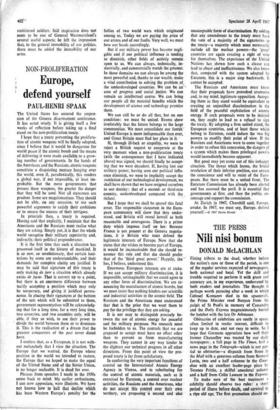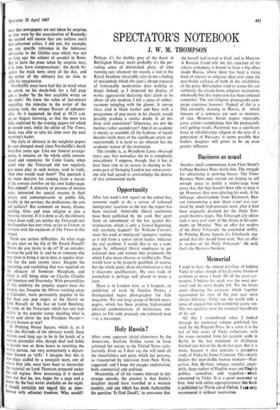Nil nisi bonum
THE PRESS DONALD McLACHLAN
Fitting tribute to the dead, whether before the nation's eyes or those of the parish, is one of the regular services expected of newspapers, both national and local. Yet the skill and trouble required to perform it with grace and accuracy are, in my experience, underrated by both readers and journalists. The thought is perhaps worth pursuing after a week in which Colonel Komarov died in his spacecraft, the Prime Minister read Bunyan from the pulpit of St Paul's in memory of Cassandra and the Daffy Express magnanimously buried the hatchet with the late Dr Adenauer.
Obituaries of celebrities are costly in space, often limited in reader interest, difficult to keep up to date, and not easy to write. So I hope that Germans appreciate how well their former Chancellor was treated by our daily newspapers: a full page in The Times, half a news page in the Telegraph—which is not par- tial to obituaries—a dispatch from Bonn in the Mail with a generous column from Bernard Levin, two and a half columns in the Guar- dian with an excellent leader-page piece by Terence Prittie, a skilful anecdotal column and a half from Cohn Lawson in the Express.
To make sure of the best treatment a celebrity should observe two rules: a short period of illness before death, and survival to a ripe old age. The first precaution should en- sure that newspapers are not taken by surprise, as they were by the assassination of Kennedy;
the second will ensure that one outlives one's
best-informed critics. I did not, for example, see any specific reference in the Adenauer
obituaries to the Globke case which was not so long ago the subject of scandal in Bonn. But to have the press taken by surprise may, it is true, have compensations: the death be- comes the main news story of the day, and the writer of the obituary has no time to stifle his imagination.
Northcliffe must have had this in mind when he asked, on his death-bed, for a full page and a leader `by the best available writer on the night.' He knew the value of last-minute topicality, the stimulus to the writer of the
evening rush, the, unique flavour of ephemer-
ality. As it happened, he died at 10.12 a.m. on an August morning, so that the news was fully exploited by the evening papers (of which he owned one), while the editor of The Times, Steed, was able to take his time over the next morning's leader.
The style of obituary in the weightier papers has not changed much since Northcliffe's death
forty-five years ago. Like our funeral arrange- ments, it remains on the whole solid, conven- tional and expensive. Sir Colin Coote, when asked why the Telegraph did not regularly give more play to such notices, used to reply, 'And who would read them?' The question is the more decisive for coming from a master of the oraison funabre on his own leader-page. Who indeed? A minority of persons of mature years, interested for special reasons in their seniors and contemporaries in public life, notably in the services, the professions, the arts and politics? But comment on music, drama, painting, films and even religion is also a minority interest. If it is done at all, the obituary is best done well; yet neither the Telegraph nor the Guardian has ever tried, so far as I know, to compete with the standards of The Times in this respect.
There are serious difficulties. At what stage do you start on the life of Mr Enoch Powell? Whom do you invite to do it? If an outsider, he must be paid for it; and he or someone else may have to bring-it up to date at regular inter- vals for the next twenty years. Imagine the repainting and varnishing that was required on the obituary of Somerset Maugham, and Which is still being done on Charles Chaplin and Simenon and Stravinsky. With personalities of this celebrity the popular papers have the burden, too. Imagine the Mirror working away at Chevalier, snore persistently popular in his day than any pop singer; or the Sketch on Lord Russell; or the Sun on Lord Beeching. Or think of the Telegraph, which has one foot solidly in the popular camp, deciding what is to be said about the late President Nasser— nil nisi bonum or not?
At Printing House Square, which is, as it were, the Harrods of the obituary world, these matters used long ago to be in the hands of a veteran journalist who, though deaf and liable to devote two or three hours to rewriting the wrong person, ran very competently a depart- ment known as 'stiffs.' I imagine that this is nowadays staffed by a youngish team, one of Whose first jobs must have been to reconsider the material on Lord Thomson prepared under the old regime. How interesting if it should turn out that he, too, hopes for a page and a leader by the best writer available on the night. I Should certainly not regard this as inter- ference with editorial freedom. Who would?







































 Previous page
Previous page